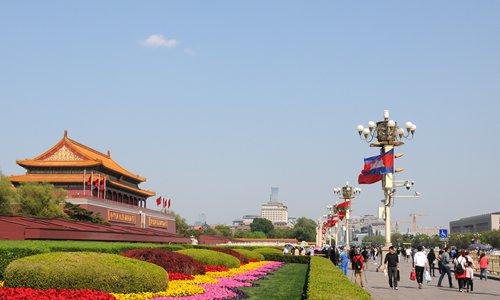HOME >> OPINION
China aligns with world order by improving it
By Zhang Shenglei Source:Global Times Published: 2019/6/3 21:18:40

Photo: VCG
President Xi Jinping delivered keynote speeches at three important diplomatic events this year - the second Belt and Road Forum for International Cooperation, the Beijing International Horticultural Exhibition, and the Conference on Dialogue of Asian Civilizations. Xi offered a Chinese approach to global governance and to dealing with the common problems faced by humanity.
In the speeches, we can clearly see Xi's global and macro vision and feel China's determination to actively promote the international order to be fairer and more rational. China's role in building the international order has shown the world that it considers building a community of shared future for mankind as an important mission.
Moreover, China has also made it clear that it will uphold peace, development, and cooperation to advance a new type of international relations based on mutual respect, fairness and justice.
Today, the world is passing through a period of great development, profound changes and enormous adjustments. Peace and development remain the theme of the times, but in the current international system there are flaws that don't go with the theme.
The modern international relations began with Western countries playing power politics. Behind that was the mindset of economic colonization driven by the spread of hegemonism. It is the main factor that causes disorder in the current international system. The current international system built on power politics could subvert peaceful development. China was passively blended into the international order. However, in the process of integration, China didn't follow the path set by the order. Instead, it has wisely promoted the transformation of the international system based on China's national conditions, China's problems and the needs of the world. Such promotion doesn't mean to overthrow the international system but to more actively integrate into the existing system and strive to make it more legitimate and complete.
China's integration into the international system has fully demonstrated the affirmation and acceptance of the existing system. Chinese leaders also have reiterated on many occasions that they support the existing international order.
After starting reform and opening-up in 1978, China has been actively participating in the development of globalization. Joining the World Trade Organization was a turning point, after which China began comprehensively promoting globalization. In the process, China has benefitted from and contributed to the international order. Noticeably, the "international order" talked about here is not the "world order" dominated by the US but one based on the UN Charter. China realized rapid development and gained national power after integrating into the international order.
The Chinese territories of Hong Kong, Macao and Taiwan have achieved different levels of development in the process of integration into the national system. Under the framework of "one country, two systems," Hong Kong and Macao developed because they aligned with the mainland's development, while Taiwan benefited from economic integration with the Chinese mainland. Upholding such "integration thought" rather than traditional zero-sum mindset has helped gain win-win cooperation and increase awareness of community of shared future.
In the meantime, a peacefully rising China achieved development and promoted benign reform in the international order. In the four decades of reform and opening-up, China has comprehensively integrated into the international order, achieved peaceful rise, succeeded in effectively allocating resources around the globe and become a world power. Simultaneously, China has acquired a unique understanding of the international order, which is demonstrated by its emphasis on humanity and peace. China's following the new type of international relations has outweighed hegemonism, and helped end misconceptions such as "clash of civilizations," "pride of civilization" and "prejudice of civilization."
As a civilization that is thousands of years old, China has always been integrating into the current international system and taking responsibility to defend the international order after the world wars and the international rule of law coming into force. At the same time, China is dedicated to promoting democratization and legalization of international relations.
The author is a scholar of international relations and a guest fellow at the Beijing-based think tank Center for China and Globalization. opinion@globaltimes.com.cn
Posted in: VIEWPOINT